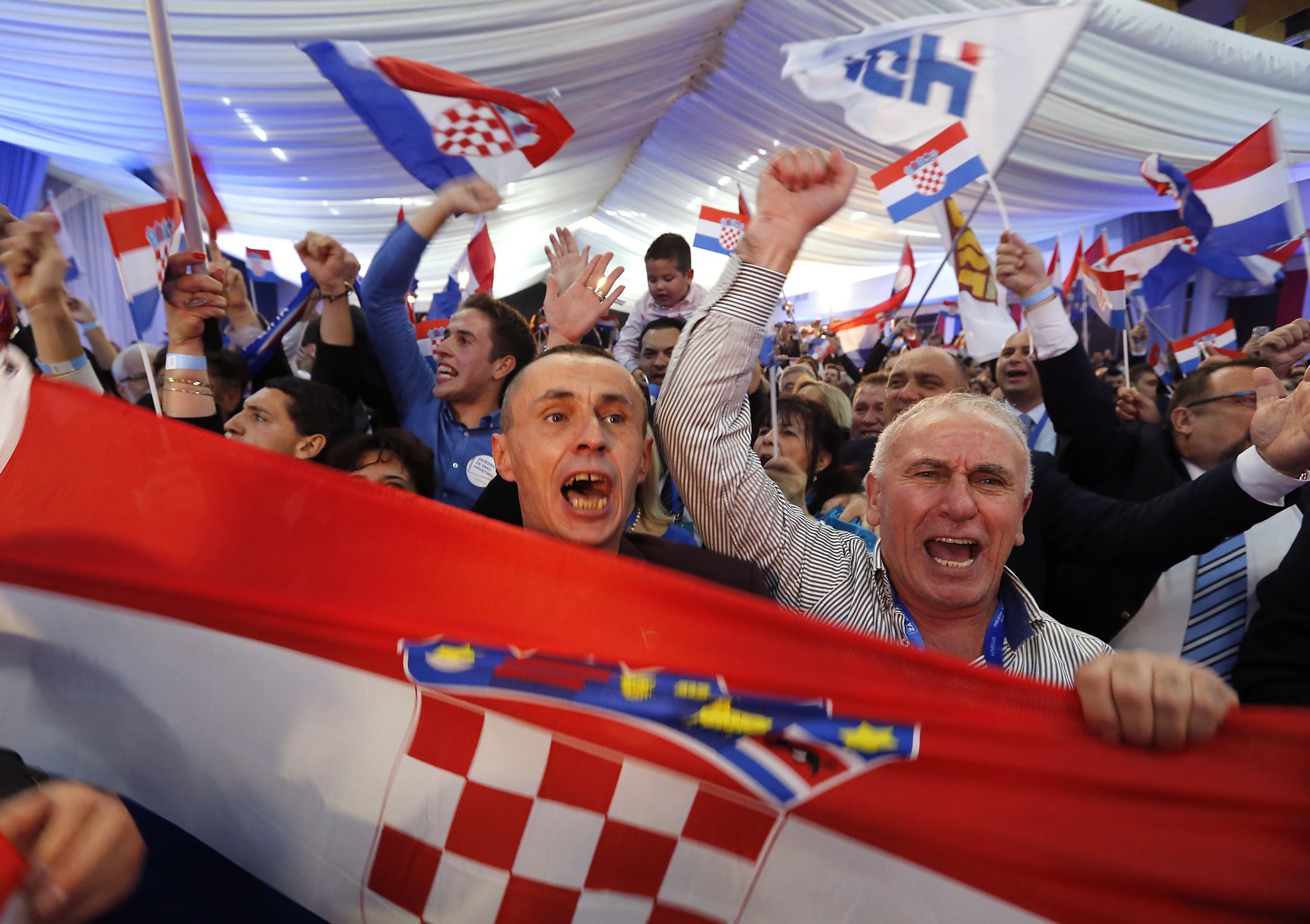The Outcome of Croatia’s Early Elections
In
Login if you are already registered
(no votes) |
(0 votes) |
Ph.D. in History, Senior Research Associate, RAS Institute of Slavonic Studies
As early elections in Croatia were prompted by the resignation of the government, the country’s leading political forces were simply unable to prepare for them properly. Consequently, they relied on exploiting the population’s nationalist sentiments, which is, by default, a key for success. As a result, the Croatia–Serbia dialogue in the summer of 2016 was tense, with the countries exchanging pleasantries. In early June, Croatia attempted to block the start of Serbia–EU membership talks; on September 6, the Serbian State Security Service arrested a Serbian–Croatian citizen charged with espionage. And there were other pointed incidents connected with the traditional reason for antagonism between the two countries: the anniversary of the 1995 events.
Even the usually moderate Zoran Milanović, former Prime Minister and leader of the Social Democratic Party, used nationalist rhetoric. A report from Milanović's meeting with the Croatian veterans of the 1990s wars was deliberately leaked; at the meeting, Milanović spoke harshly about the country’s neighbours. However, his statements failed to impress Croats.

EPA/ANTONIO BAT
The main result of the elections – which largely repeated the outcome of November 8, 2015 – was an increased gap between the Croatian Democratic Union (HDZ) and the Social Democratic Party (SDP). A year ago, the gap was three seats (59 compared to 56). It has since grown to seven seats (61 to 54). Most likely, just like in 2015, the HDZ will form a government together with the Bridge of Independent Lists (MOST) party, which came third in the elections. The HDZ’s current leader, Andrej Plenković, will most likely play the key role in the new government; he is, like President of Croatia Kolinda Grabar-Kitarović, a career diplomat.
.jpg)
Youtube/Andrej Plenković, MEP
The Return of Tuđman’s Croatia
It should be noted that the HDZ strengthened its positions despite regular corruption scandals and the instability of its leadership: the party has had four chairs since 2000. Even though a democratic system appears to give the population an opportunity to rid the country of corrupt politicians, the people still vote for the HDZ. This phenomenon can be explained by the fundamental nature of the party, its well-developed network of party cells (the HDZ has had offices throughout Croatia since 1991), the fact that it enjoys the support of the Croatian diaspora and, finally, by the conservatism of Croatian society. Their victory is also due to low voter turnout, which was the lowest in the history of democratic elections in Croatia (52.6%). The HDZ’s voters simply proved to be more active.
Apparently, after two four-year terms of centre-left experiments, the intention is to revise the ideas of Tuđman’s Croatia, which were somewhat forgotten in the 2000s. The HDZ’s leaders speak about this openly. Let us note that in Croatia’s political theory, Tuđman’s ideas do not represent radical nationalism, which is how they are traditionally considered; rather, they are moderate European centre-right politics. Still, not everyone would agree with this interpretation.
Ironically, the HDZ could indeed be considered a centrist party. The thing is, the HDZ’s most likely coalition partner is again MOST, with its 13 votes. The party was founded in Metković, a city close to Dubrovnik with historical ties with Herzegovina, which is populated by radical fundamentalist Croats. If the HDZ does need to demonstrate its moderate politics to retain the vote outside its traditional electorate, then MOST can exercise its radicalism freely.
The question is, are Tuđman’s ideas practicable? His principal idea was the fight for independence, first from Yugoslavia, then from the Western dictate. The problem is, the HDZ cannot fight for freedom from the European Union and NATO, which Croatia has long tried to join. Under these circumstances, Tuđman’s ideas could manifest themselves in enhanced authoritarianism and Croatian society becoming increasingly fascist in nature.
Like Grabar-Kitarović, Plenković is a fairly young politician for such high-ranking positions – he is only 46. Given that the opposition is facing crisis, both politicians could stay in power for a long time. Croatia faces the task of modernizing its armed forces before 2025. Given its budget deficit, only right-wing politicians would vote for increasing military spending. This complies with the task of enhancing discipline and the military capabilities of NATO members in Central and Southeast Europe set at the Wales and Warsaw summits.
Foreign policy could become another area for applying Tuđman’s ideas. Before becoming the HDZ’s leader, Plenković was a European Parliament deputy, where, in 2014, he headed special commission on relations with Ukraine and was even awarded the Ukrainian Order of Merit.
Plenković adheres to the following position on the Ukrainian crisis: Ukraine is a victim of aggression and the violation of international law. He thus draws direct parallels with the Serbia–Croatia conflict of the 1990s, which Croatia treats as aggression on the part of Serbia. Alexander Levchenko, Ukraine’s Ambassador to Croatia and Bosnia and Herzegovina, speaks in the same vein as he conducts active propaganda and regularly publishes articles in the leading media.
This transformation could harm Russia–Croatia bilateral relations. Russian diplomacy proceeds from the premise that the problems in relations between Serbia and Croatia should not influence Russia–Croatia relations. This is how it had largely worked: the foundations of bilateral relations were laid in the 1990s. Russia was one of the first states to recognize Croatia’s independence and economic cooperation was intensified in the late 1990s. And even though many Croats view Russia favourably today, propaganda-simplified positions could devalue the foundations of Russia–Croatia relations, and Russian diplomats will have a harder time making Russia’s position heard. Naturally, Croatia is unlikely to lift the sanctions right now, and Russia–Croatia relations should not be expected to return to the pre-2014 level.
The Opposition Crisis
A new defeat of the Social Democratic Party was another important result of the elections. Unlike the HDZ, which could be described as the “party of hawks,” the SDP has always been largely an intellectual movement. It has only changed leader once over the 25 years of its existence, and that was due to natural causes. Yet today, the intellectualism that was prized when the party was in power (in 2000-2003 and 2011-2015) has turned into a lack of political will. Since 2013, the Social Democrats have lost five elections in a row (regional, presidential, elections to the European Parliament and parliamentary elections). Their position was undermined by the economic crisis, soured relations between Russia and the West and the migration crisis, for which the government was not prepared in September 2015. As a result, the SDP lost a huge number of votes even in the traditionally loyal city of Rijeka and Istria.
Even though theoretically the SDP still has a shot at forming the government, in reality, it is yet another defeat. Those who just a few years ago called Milanović Croatia’s smartest politician now note his haughtiness and inability to admit his mistakes. Another Social Democrat, former President of Croatia Ivo Josipović (2010-2014) is considered an altogether spineless politician.
Serbian political scientist J. Bakić believes that today, Milanović has nothing to offer Croatian voters, and his attempt to play on the nationalists’ field was largely a desperate attempt to court the vote. Therefore, it may be stated that the Social Democratic Party faces another identity crisis, like the ones it went through in the early 1990s and after the collapse of the first social democratic government in 2003. Based on the history of the party, we can say that this means shifting into an entrenched opposition mode and a potential change in leadership. While the article was being written, the news broke that Milanović is resigning as the party’s leader.
On the Way to a New Identity?
Like the entire region, Croatia needs a strong left-wing movement. Firstly, since the 19th century, social ideas are the backbone of the philosophy of any eminent thinker and statesman in the Balkans; they are the philosophical foundation of independent statehood. Secondly, a left-wing movement is one of the foundations of Croatian society today. The central idea of Croatia today is the so-called “concept of reconciliation” (pomirba) between the left and right wings of Croatian society (“ljevica” and “desnica”), essentially between the supporters of the Ustaše and the supporters of the guerrilla fighters. Thirdly, the left-wing tradition recognizes the foundation of the socialist republic in 1944-1945 as the starting point for modern-day Croatia, and that means stabilization of the existing borders. Finally, it is a safety mechanism against Croatia being pulled into various reckless gambles – as we remember from the history of the 20th century, when the right wing becomes excessively strong, it foreshadows a major war in Europe. The European Union is similarly uninterested in a weakened left wing, as it is interested in stability, but not in seeing Croatia transform into another Hungary.
The success of the Human Shield social populist movement, which has increased its number of seats in parliament eightfold in just one year (from a single seat) reflect the demand for a new political force. The demand is shaped by voters born in Croatia after 1991. On the one hand, they imbibed the values of their country’s independence. These people treat radicalizing the problems of the past with greater scepticism, but they see clearly the problems of the current system. Disagreements with the neighbouring republics do not appear to be hopeless, as their population essentially faces the same problems. The development of this trend could lead to systemic shifts in the entire post-Yugoslavian space. The absence of a positive programme, in addition to populism, nihilism, the loss of the original impetus and the discrediting of leaders could become the principal obstacles. Finally, as we know from the example of the late 1960s, revolutionaries either leave the stage or become the staunchest conservatives.
(no votes) |
(0 votes) |




